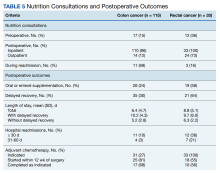Longitudinal Dynamic in Weight Loss Impacts Clinical Outcomes for Veterans Undergoing Curative Surgery for Colorectal Cancer
Background: Definitions of malnutrition imperfectly reflect nutritional status or predict perioperative consequences. We sought to identify predictive nutritional trends by examining the effect of preoperative weight on postoperative outcomes in patients with colorectal cancer (CRC).
Methods: This retrospective review examined 148 patients with CRC treated with curative-intent surgery at the Veterans Affairs Ann Arbor Healthcare System in Michigan from January 1, 2015 to December 31, 2019. We evaluated weight dynamics of patients, starting 1 year before cancer diagnosis until 1 year after surgery. We evaluated the association of these weight dynamics with surgical outcomes. Primary outcomes observed were hospital readmission and length of stay (LOS), chemotherapy completion, and delayed recovery defined as abnormal clinical developments.
Results: There were 115 patients in the colon cancer (CC) cohort and 33 in the rectal cancer (RC) cohort. Low preoperative albumin (< 3.5 g/dL) was present in 25 patients with CC (22%) and 11 patients with RC (33%). Six-month preoperative weight loss of at least 3% occurred in 32 patients with CC (36%). Delayed recovery was observed in 35 patients with CC (30%) and 21 patients with RC (64%). Nutrition consultation rates for the CC and RC groups were 15% and 36%, respectively, before the operation; 95% and 100%, respectively, for postoperative inpatients; and 12% and 73%, respectively, for postoperative outpatients. Six-month preoperative weight loss of ≥ 3% was significantly associated with delayed recovery (P < .001) and 60-day readmissions (P = .015) but not increased LOS or chemotherapy noncompletion.
Conclusions: A ≥ 3% weight loss 6 months preceding curative surgery for CRC was associated with adverse outcomes. An intensive nutrition prehabilitation program initiated at the time of cancer diagnosis is needed and may reduce associated complications.
Nutrition Consultations
In the CC group, preoperative nutrition consultations (either inpatient or outpatient) occurred in 17 patients (15%). Inpatient postoperative nutrition evaluations occurred in 110 patients (96%) (Table 5).
In the RC group, preoperative inpatient or outpatient nutrition consultations occurred in 12 patients (36%). Eight of those occurred before initiation of neoadjuvant chemoradiotherapy. All 33 patients received an inpatient postoperative nutrition evaluation during admission. Oral or enteral nutrition supplements were prescribed 19 times (58%). Postoperative outpatient nutrition consultations occurred for 24 patients (73%). Of the 19 patients who were readmitted to the hospital, 3 (16%) had a nutrition reconsultation on readmission.
Outcomes
The primary outcomes observed were delayed recovery, hospital readmission and LOS, and completion of adjuvant chemotherapy as indicated. Delayed recovery was observed in 35 patients with CC (40%) and 21 patients with RC (64%). Multivariable analysis in the CC cohort demonstrated that weight change was significantly associated with delayed recovery. Among those with ≥ 3% weight loss in the 6-month preoperative period (the weight measurement 6 months prior to diagnosis to date of surgery), 20 patients (63%) had delayed recovery compared with 15 patients (27%) without ≥ 3% weight loss who experienced delayed recovery (χ2 = 10.84; P < .001).
Weight loss of ≥ 3% in the 6-month preoperative period also was significantly associated with complications. Of patients with at least 3% preoperative weight loss, 16 (50%) experienced complications, while 8 (14%) with < 3% preoperative weight loss experienced complications (χ2 = 11.20; P < .001). Notably, ≥ 3% weight loss in the 1-year preoperative period before surgery was not significantly associated with delayed recovery. Any degree of 30-day postoperative weight loss was not correlated with delayed recovery. Finally, low preoperative albumin also was not correlated with delayed recovery (Fisher exact; P = .13). Table 3 displays differences based on presence of delayed recovery in the 88 patients with CC 6 months before surgery. Of note, ≥ 10-lb weight loss in the 6 months preceding surgery also correlated with delayed recovery (P = .01).In our cohort, 3% weight loss over 6 months had a sensitivity of 57%, specificity of 77%, positive predictive value 63%, and negative predictive value 73% for delayed recovery. By comparison, a 10-lb weight loss in 6 months per ASPEN criteria had a sensitivity of 40%, specificity of 85%, positive predictive value 64%, and negative predictive value 68% for delayed recovery.
Hospital Readmissions and LOS
Hospital readmissions occurred within the first 30 days in 11 patients (10%) in the CC cohort and 12 patients (36%) in the RC cohort. Readmissions occurred between 31 and 60 days in 4 (3%) and 7 (21%) of CC and RC cohorts, respectively. The presence of ≥ 3% weight loss in the 6-month







